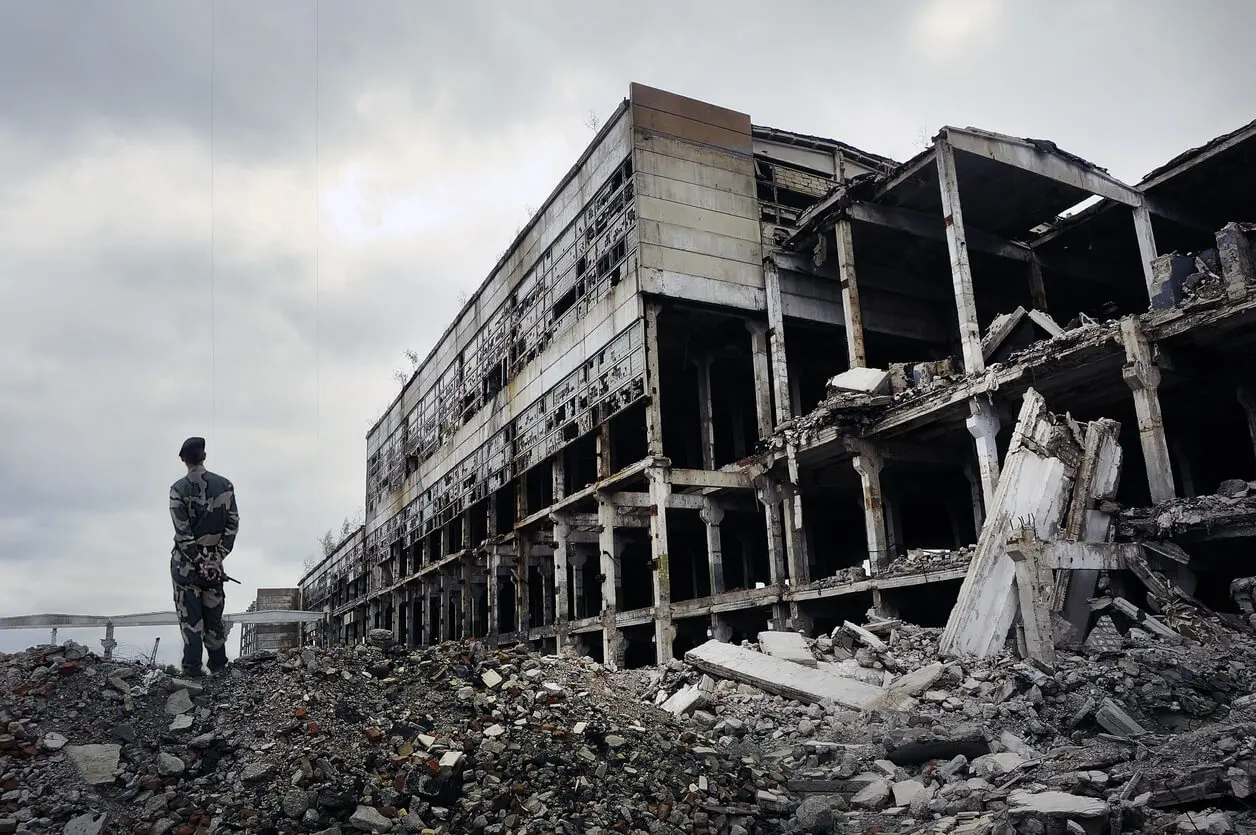5 Phrases and Philosophical Reflections on War


Written and verified by the philosopher Maria Alejandra Morgado Cusati
Unfortunately, wars have accompanied humanity throughout history. This has led numerous philosophers to reflect on the nature, causes, and consequences of war in human and universal culture.
In this sense, thinkers who have addressed this phenomenon have raised questions such as the following:
- What is war?
- Is a world without war possible?
- What is its purpose?
- Are there just wars?
Having said this, let’s take a look at how philosophers have answered these questions throughout history. Let’s get to know the most relevant reflections on war.
1. The human being has a natural tendency to war
War is the natural state of man. -Arturo Pérez-Reverte
Since ancient times, several thinkers have affirmed that conflict and war are inherent qualities of the human being. For example, for Thucydides, a Greek historian of the 5th century B.C., the increase of power of one of the parties is the origin of war; this is an aspect that he considered natural in the human species.
Plato, for his part, defended that the natural state of cities was war, which was promoted by the antagonism that.s present in the nature of man.
However, Plato didn’t justify any type of war. He rejected those that took place within the city, although he defended combat with any external enemy: barbarians who disturbed internal peace.
Therefore, for Plato, peace consisted not only in maintaining a friendly relationship among the Greek citizens themselves and regulating internal warfare, but also implied avoiding external interference by barbarians in one’s own territory.
Finally, the Spanish philosopher Gustavo Bueno maintained that war was a profoundly human phenomenon. While it’s a brutal and dangerous process, it’s related to who we are as a species and to our development as a civilization.
Like this article? You may also like to read: What is Aesthetics in Philosophy and What Does it Study?
2. The debate and reflections on just war
All wars are holy. I defy you to find someone who does not believe that heaven is on his side. -Jean Anouilh
Another much-debated topic in philosophy is the legitimization of war. In this regard, Plato affirmed that war was legitimate as long as its purpose was to defend the order of a State.
However, if wars are the product of greed, then they’re illegitimate, although inevitable, according to Plato. The Athenian philosopher believed greed to be part of our nature.
In the Middle Ages, reflections on war in Western culture were permeated by Christianity. In this case, St. Augustine of Hippo considered that war was evil and should be avoided.
Nevertheless, he defended the existence of just war under justified causes. In this sense, plundering and attacking other states could not be legitimate, but the defense of the state against aggression or the redirection of heretics to the right path of faith would be.
For his part, Niccolo Machiavelli defended that war and force were above justice. Therefore, war could be neither just nor unjust, but inevitable, necessary, and useful to impose order in a State.
These positions are opposed to the perspective of Kant, who argued that no human being should be sacrificed. We are not means to an end. Therefore, he asserted that war should be avoided at all costs, and there’s no moral justification for it.

3. Human nature doesn’t need to involve conflict
It’s not enough to win the war; it’s more important to organize peace. -Aristotle
Just as there are thinkers who defend that conflict is inherent to human nature, there are others who affirm that agreement is what defines us as a species.
Within this perspective, we find Aristotle, who also reflected on war. He believed that the human being is the only animal capable of appreciating the difference between good and bad, just and unjust. Therefore, we’re the only species capable of avoiding conflict.
Furthermore, according to the Stagirite, the human being is a political animal, which tends by nature to live in union with others, creating societies. Our reasoning capacity can allow us to discern that conflict is not always the best option.
However, Aristotle admitted that the order of the polis generates conflicts, since agreements and rules are imposed. In this sense, the conflicts that arise will have a certain degree of violence that will never be completely suppressed. In these cases, the purpose of war will be to restore peace.
4. The perpetual peace project
Even philosophers praise war as ennobling for humanity while forgetting the Greeks, who said: evil is the war that engenders more evil than it eliminates. -Kant
The perpetual peace project has been addressed by philosophers such as Rousseau, Leibniz, and Kant. It consists of proposing a plan that guarantees universal and lasting peace.
In this regard, Kant wrote a political treatise entitled On Perpetual Peace. In it, he presents some proposals to guarantee the peace of states:
- Eliminate the possibility of states being ceded or donated to private individuals.
- The elimination of standing armies.
- Eliminating national debt since it generates tensions between nations.
- The adoption of republicanism as a form of government and the freedom of federated states within each nation.
Hegel, for his part, argued that there could be neither perpetual peace nor an international legal order. After all, individual desire often comes before the desire to maintain peace between states.
Moreover, according to Hegel, war should not be avoided. He believes that it’s the means that allows a certain group of people to dominate over another.

We think you may be interested in reading this, too: The Slow Life: Get to Know this Lifestyle and Learn How to Live it
5. The devastating consequences of world wars
Mankind must find an end to war. If not, war will bring an end to mankind. -John F. Kennedy
History has shown us that the way in which war occurs has changed over time. As the centuries have passed, new weapons and strategies have been added, to the point of reaching higher levels of destruction and barbarism.
During the 20th century, the destructive capacity of human beings became evident with the world wars and the development of nuclear weapons. The philosopher Günther Anders considered these facts to be sufficient reasons to avoid any war from now on.
It was from the last century onwards that mankind became aware of its capacity for self-destruction and began to fear it. Since then, wars have continued to exist but have been approached in a different way: stripped of any hint of virtue and with greater prudence.
Today, more than ever, it’s necessary to reflect deeply on war. The international conflicts that have unfolded in recent years leave questions as important as the future of humanity on the table.
All cited sources were thoroughly reviewed by our team to ensure their quality, reliability, currency, and validity. The bibliography of this article was considered reliable and of academic or scientific accuracy.
- García R. La teoría de la guerra de Maquiavelo. Signos Filosóficos [Internet]. 2015 [consultado 28 de junio de 2022]; 27(33): 28-51. Disponible en: https://www.redalyc.org/pdf/343/34348294002.pdf
- Lazar Z. War [Internet]. California: Stanford Encyclopedia of Philosophy; 2016 [consultado 28 de junio de 2022]. Disponible en: https://plato.stanford.edu/entries/war/
This text is provided for informational purposes only and does not replace consultation with a professional. If in doubt, consult your specialist.








